Hundreds pack Newport Cathedral for the Enthronement of the 15th Archbishop of Wales
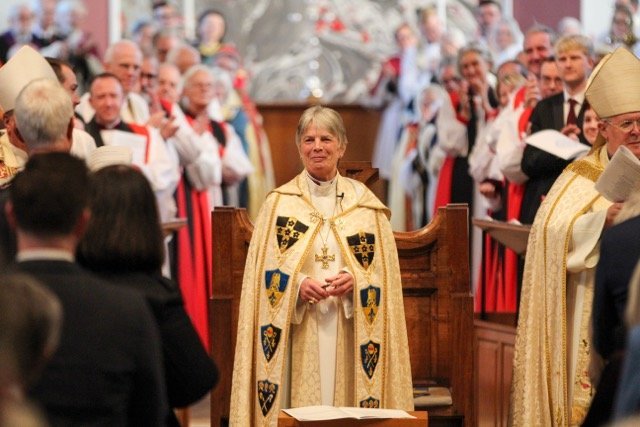
What happens at an enthronement?
The Archbishop of Wales, the Most Reverend Cherry Vann, was enthroned in a national service at St Woolos Cathedral, Newport, on Saturday, 8th November.
The enthronement followed the Archbishop’s election by the Electoral College of the Church in Wales in July.
Originally from Leicestershire, Cherry Vann was ordained as a deacon in 1989. She was then among the first women to be ordained as a priest in the Church of England in 1994. After serving in various roles in the Diocese of Manchester, including as chaplain to the deaf community, she then served as Archdeacon of Rochdale for 11 years before being consecrated as Bishop of Monmouth in 2020. She continues in the role of Bishop of Monmouth.
What happens at an enthronement?
At the ceremony in St Woolos Cathedral, Archbishop Cherry was enthroned in the Archepiscopal Chair in front of the High Altar. The Chair will remain at Newport Cathedral throughout her time as Archbishop.
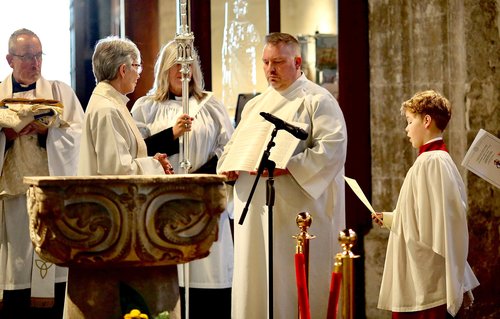
On entrance to the Cathedral, the Archbishop was greeted by a young member of the Choir. This took place at the font in the oldest part of the Cathedral, where Gwynllyw (Woolos) founded his church in 5th century. An act of penitence led by Archbishop Cherry, whilst kneeling before the throne, followed.
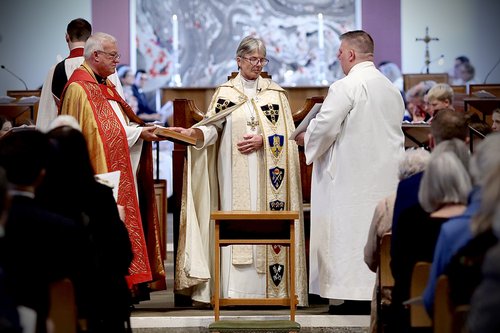
Later in the service, the oaths of office were taken using the Monmouth Archbishops’ Bible used at the enthronement of all previous Bishops of Monmouth who have become Archbishop of Wales - Edwin Morris, Derek Childs, Rowan Williams, and now Archbishop Cherry.
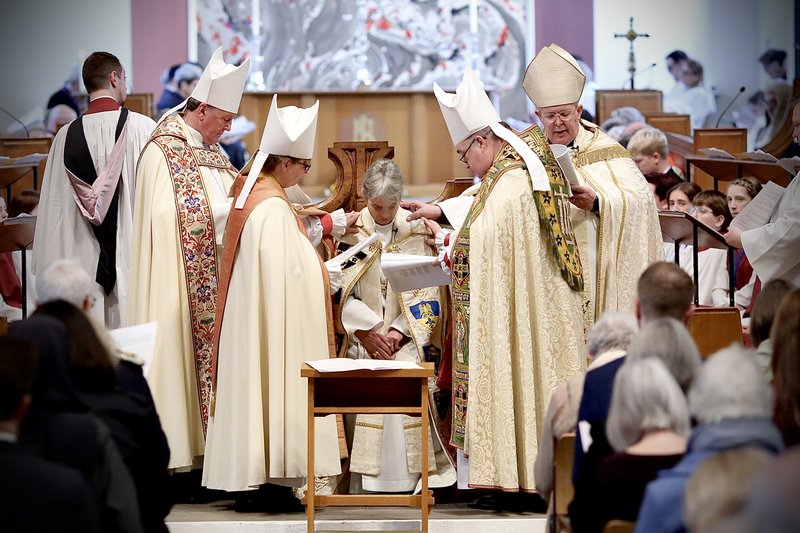
Once enthroned and greeted by the whole assembly from across Wales and beyond, the Archbishop took her seat on the Archiepiscopal throne as the Cathedral Choir sing The Call of Wisdom by Will Todd, composed for Her Late Majesty Queen Elizabeth the Second and sung at St Paul’s Cathedral for her Diamond Jubilee service.
Archbishop Cherry then preached before leading the congregation in the Nicene Creed, this year being its 1700th anniversary.
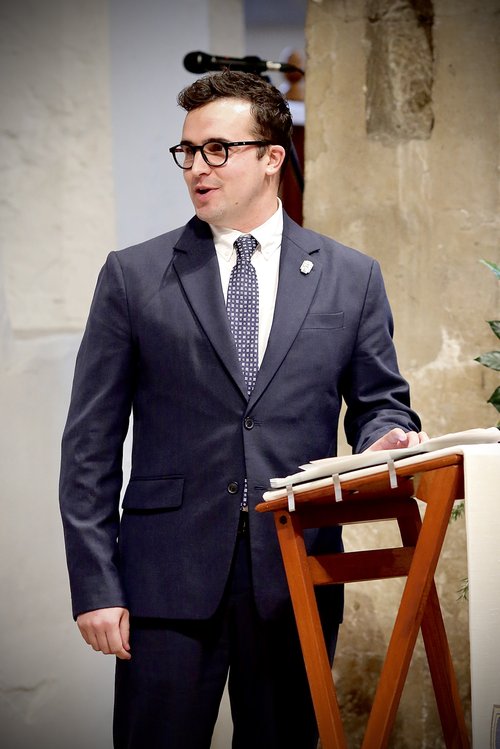
Dr Cynan Llwyd, Secretary General of Cytûn, the partnership body for churches in Wales, introduced the Archbishop to church and faith leaders from across Wales, whilst Bishop David Morris introduced the Archbishop to representatives of the Church of England, the Church of Ireland, the Scottish Episcopal Church and the Archbishop of Uppsala, representing the Porvoo Churches, an ecumenical fellowship of European Anglican and Evangelical Lutheran churches, of which the Church in Wales is a member.
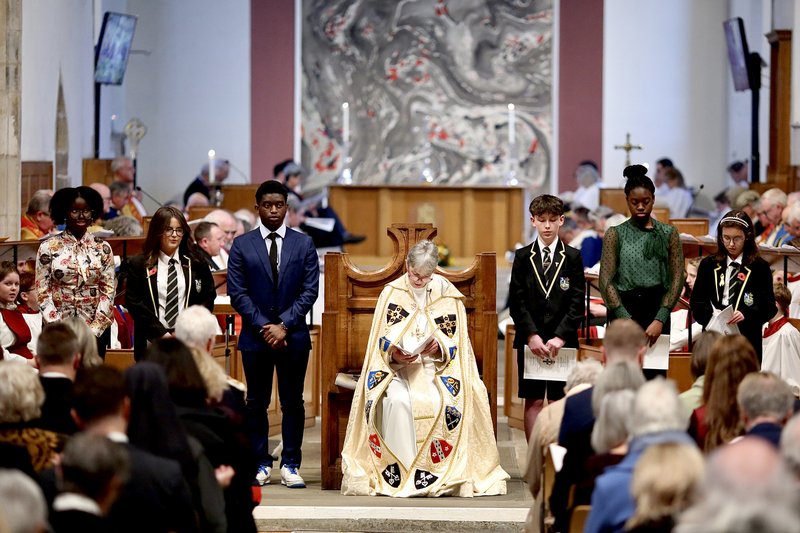
Prayers followed, led by pupils from St Teilo’s Church in Wales High School, Cardiff and Ysgol Penrhyn Dewi, St Davids. The service concluded with an Act of Commitment to the mission of the church and with an older chorister asking the Archbishop if she will promote the wellbeing and unity of the Church and be a Good Shepherd to her people after the example of Christ.
The Archbishop and clergy then processed out of the Cathedral.
The music for the service was led by the Director of Music, Tom Coxhead, and the Cathedral Choir.
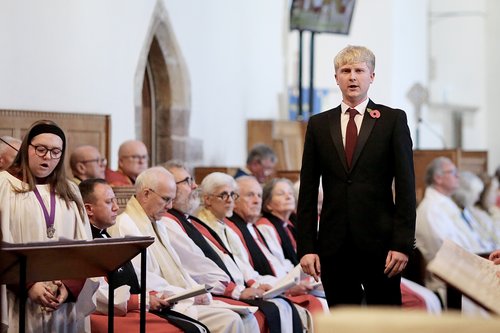
The service featured the Welsh-language Kyrie composed by Paul Mealor, which was sung at the Coronation of King Charles in 2023. It was sung by the young Welsh bass-baritone Owain Wyn Rowlands. The former Royal Harpist, Alis Huws, who also played at the Coronation, also took part.
The Cross of Wales, a processional Cross given by The King as a gift to the churches in Wales for its centenary, led the procession into the cathedral.
Order of proceedings:
- 2:15 PM – All guests seated/robed
- 2:30 PM – Dean welcomed dignitaries, last entry for guests, live stream started
- 2:45 PM – Clergy procession
- 3:00 PM – Enthronement service began
- 4:30 PM – Reception began
The Very Reverend Ian Black, Dean of Newport Cathedral, said, “It is a delight to be able to welcome everyone to the Cathedral for this special moment in the life of the Church in Wales. This marks a new beginning, as we pray that together we may seek to be bearers of light and hope in our nation.”
The service was live-streamed on social media and the Church in Wales’ website to enable wider participation.
The enthronement of the first Archbishop of Wales was on the 1st June 1920 at St Asaph Cathedral. This followed the Disestablishment of the Church and its independence of the Church of England. You can watch the service here: (19) Enthronement of the First Archbishop of Wales June 1st 1920 - YouTube
Archbishop Cherry is the first woman to serve as Archbishop of Wales, making this enthronement a truly significant and historic occasion.
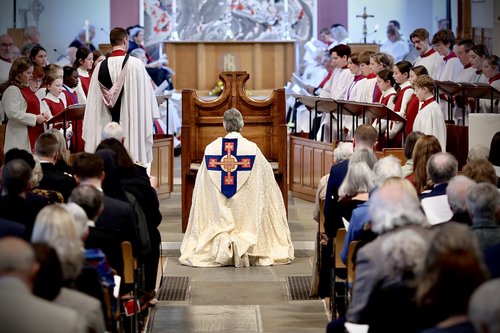
When first elected as Archbishop, she said: "The first thing I shall need to do is to ensure that the issues which have been raised in the last six months are properly addressed and that I work to bring healing and reconciliation, and to build a really good level of trust across the Church and the communities the Church serves.”
The Bishop of St Asaph, the Rt Revd Gregory Cameron, said: “I am hugely pleased to welcome Cherry as the 15th Archbishop of Wales. In her time as bishop of Monmouth, she brought healing at a time of need, and a vision of the Church as a renewed community under Christ that can now be translated and enlarged for the whole of the Church in Wales.”
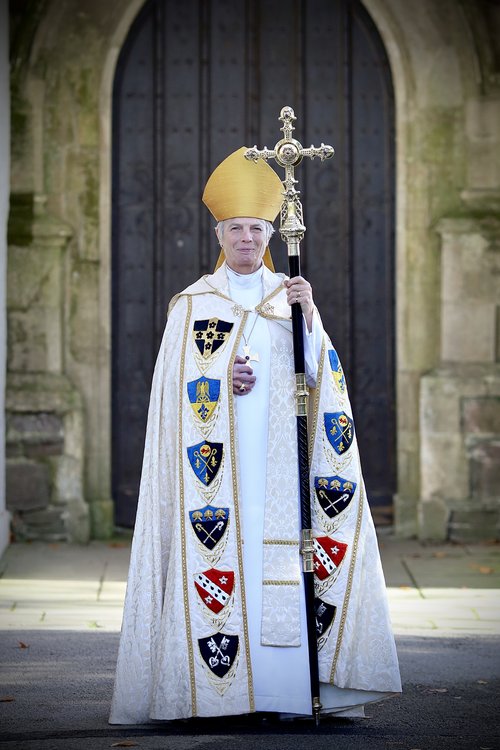
Archbishop Cherry's Sermon:
Back in the mid 1990’s, I’m not sure exactly when, I came across a poem that has stuck with me ever since. I don’t know how or why it came my way but it has shaped my understanding of ministry and of the church down the years and it seems rather fitting to reflect on it with you on an occasion such as this.
Its title is ‘In search of a round table’ and its author, someone called Chuck Laythrop. Here are some parts of it:
Concerning the why and how and what and who of ministry, one image keeps surfacing: A table that is round.
It will take some sawing to be roundtabled.
Some redefining and redesigning, some redoing and rebirthing of narrow-long Churching can painful be, for people and tables.
It would mean no daising and throning, for but one king is there and he is a foot washer, at table no less.
And what of narrow-long ministers when they confront a round table people,
After years of working up the table to finally sit at its head
Only to discover that the table has been turned around?
They must be loved into roundness,
For God has called a People, not ‘them and us’.
‘Them and us’ are unable to gather round; for at a round table there are no sides and ALL are invited to wholeness and to food..
Roundtabling means no preferred seating, no first and last, no better,
And no corners for the ‘least of these.’
Roundtabling means being with, a part of, together and one. It means room for the Spirit and gifts and disturbing profound peace for all.
What would it take for us to become a round tabled church? What might we be better able to share with the world and be for the world if we were truly a People, and not ‘them and us’?
We live in troubling times. Division and hate, mistrust and disinformation are rife across our world and in our societies here in Wales. There seems to be an increasing tendency, an encouragement even (from some at least) to define ourselves over and against others in ways that significantly threaten the community cohesion that many have spent decades trying to build. Many are frightened as wars and tensions across the world play out in our streets and our communities. It’s hard sometimes to know what to say without the fear of offending someone or some group of people. Whilst at the same time, the need to defend the right to freedom of speech has rarely been more urgent.
Climate change is already destroying livelihoods and homes. Continuing increases in the cost of living are rendering many fearful and anxious for the future.
Whilst the church cannot solve the world’s problems, we can and are called to model a very different way of going on, which holds out another way of being and the hope that is the Kingdom of God. The poem about roundtabling reflects some key themes in the gospel, the good news of Jesus, that we’re called to proclaim with all that we have and all that we are.
And so, in our attitudes and behaviours, in the decisions we take and the values we espouse, in the way we live and relate to one another, there is to be no ‘them and us’. For all are created by God and made in God’s very image and that is our starting point. Hard though it may be sometimes, we are invited by God to celebrate the diversity of our global humanity and to embrace it as a gift. In God’s economy, all are invited and all are welcome as children of the same heavenly father. We are one in him.
There is to be ‘no daising and throning’ – rather ironic in the context of what is happening here this afternoon, with a rather large throne sitting centre-stage. But the gospel reminds us, as does the poem, that we are all equal in God’s sight. God is not in the business of hierarchies. Indeed, Jesus in many of his parables and sayings turns upside-down our natural tendencies to think in terms of greatest and best, highest and most important. Rather, he warns us that the first shall be last and the last shall be first. We are to see others as God sees them, and ourselves likewise.
And we are to take our queue from Christ our King, who is a foot-washer at table, no less. For this is the example he sets for us to follow, as we heard a moment ago in our gospel reading. But this is about more than simply serving those in our own tribe or church or the people who are like us. In another passage, Jesus tells us that when we feed the hungry, welcome the stranger, visit for the sick and those who are in prison, when we care for those who are considered to be ‘the least of these’, then we are doing it for him. This is what love looks like in its basic and most practical terms.
It all sounds very good and noble and it’s all very familiar to those of us who claim to follow Jesus. But, if we take it seriously and seek to live it out, then we soon discover that it’s hard work, and it doesn’t come easily.
For it means reaching out across the divides and risking being rejected and ridiculed for our efforts. It means staying with and being alongside those who push our buttons and infuriate us beyond measure with grace and charity and an open heart. It means being prepared to let go of our own power and ability to control in order to empower and enable others, to be challenged and changed by those who come, whether to our church or to our country, and to seek that of Christ even in those who repulse us, revile us and threaten our comfortable lives.
Isaiah was only able to say those well-loved words, ‘here am I, send me’ because he’d captured a vision of the glory of the Lord, he’d recognised his own unworthiness and he’d experienced the forgiveness and grace of God. Then and only then was he moved and stirred to offer himself for service. And the verses following our passage today spell out what an incredibly challenging task he was given.
St Paul compares the weakness and fragility of his and our human nature with clay jars; worn, pitted and cracked by the demands, hurts and disappointments of life. He reminds his readers not to confuse the treasure of the gospel and its power to transform with our own human ability and strength that are so limited and so easily broken. Our focus and attention must be on the good news we carry within us and the power of God that can and has changed us. For that is what the world so desperately needs and that is what we’re called to proclaim; not ourselves.
And in Jesus’s example of loving service we see the very heart of God which is encapsulated in the image of a round table to which all are invited, all are welcome and at which, all are fed.
A different way of living. A different way of being, which we’re invited not just to enjoy and keep for ourselves within the church, but to share with the world and be for the world.
May God give us grace to love one another into roundness, in the church and in the world, that we may increasingly discover what it means to ‘be with, to be a part of, together and one.’